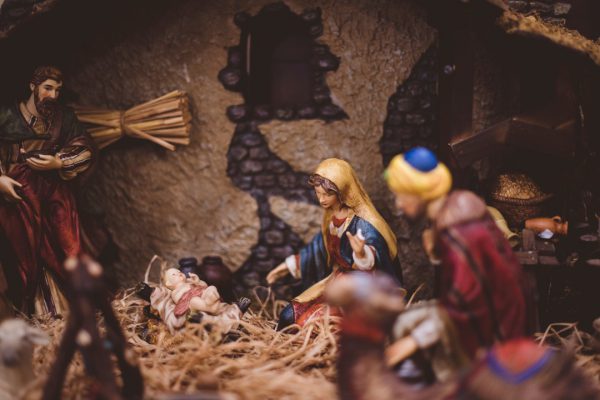This post on the importance and beauty of poetry was written by Abram Newcomer. You can find his poetry and articles on his blog at Who Made The Eyes.
To the Christian belongs a particular duty to love and study poetry. It is no mistake that the largest book in the Bible is devoted to poetry, along with most of the literature found throughout the Prophets, the Proverbs, Job and Revelation. Why is this so? When seeking to describe the comfort, security, and guidance that the LORD provides him, why does David not choose to record these thoughts in volumes of verbose theological exposition, but rather in a mere 19 lines of poetry (Psalm 23)? Why does God choose poetic language when speaking to his people words that are of crucial importance (Prophecy)? Surely, isn’t there a more straight-forward form of language that he could have used? The question is posed, yet the answer should be no surprise.
It is often the case that poetry can say in very few words what would otherwise require numerous words of direct explanation. Indeed, if a “picture speaks a thousand words” and poetry is the art of crafting literary pictures for the reader, then it is no wonder that poetry will often say more than it is saying. This is evident by the fact that we can read Psalm 23 our whole lives and continue to discover new riches hidden within its words and images. It is these discoveries that continually capture our hearts and imaginations often more than straight exposition could hope to do.
There is no denying that God loves poetry for he has been pleased to reveal himself by it through the pens of the men of Scripture. And how kind it is of God to reveal himself in these ways! He writes not only to our minds, but also to our eyes and our ears and our taste. The words of Scripture echo the beauty that is found in his nature, the beauty that finds its definition in him.
How precious to me are your thoughts, O God!
How vast is the sum of them!
If I would count them, they are more than the sand.
I awake, and I am still with you. (Psalm 139)
How sweet are you words to my taste,
sweeter than honey to my mouth! (Psalm 119 – Mem)
So, it is nothing new for us to hear that we ought to study and appreciate Scripture and its poetry. But what about non-Scriptural poetry? Is it worth our time? While there may be a multitude of opinions and convictions on this topic, what we can say is that if you consider studying commentaries, books, sermons, and blogs valuable to your growth as a Christian, then you ought to consider adding poetry to that list. You may find just as much, if not more, encouragement and awakening in the Christian poems of history as you would from the many books we have on our shelves. Only, the bonus of poetry is that it is often short and more manageable for those of us who struggle finishing the books that we start.
If you are unsure of what poetry to read (as we all are), then Leland Ryken’s book “The Soul In Paraphrase” is a great resource. It is a collection of some of the great “devotional poems” with brief commentaries on each one. It teaches you how to read poetry, what to look for and how to appreciate it.
As an example of what poetry can do, I’ve featured one of John Donne’s “Holy Sonnets” in the remainder of this blog. The full text is given below, along with a discussion on what it is saying. However, before we begin, we will take a brief look at the poet himself and then at the form of the poem.
The Poet
John Donne (pronounced “dun”) lived from 1572 to 1631 in England during the time of Puritans. Though raised as a Catholic (in a time when this was against the law) he later converted to the Anglican church, of which he would eventually become a minister. As a poet he is best known for his works of vivid love poetry (which, some would say, were from his earlier years) in addition to his works of religious poetry originating later in his life. His collection of 19 poems, called the “Holy Sonnets,” are remarkably Reformed, being rich in biblical imagery and theological topics. They often are themed around the utter dependence of the sinner on his holy God and the marvel of what God has done for us through Christ. He is known for bringing together words and images that are shockingly opposed, all for the purpose of heightening tension and teasing out the paradoxical truths of the spiritual realities that we experience.
The Form
What we don’t often consider when reading poetry is the form in which it is written. Poetry, just like music, has an underlying structure (form) and order that will define how the poem “feels” and “sounds” to the reader. Though not necessary, understanding these forms will undoubtedly increase the reader’s appreciation and enjoyment of the poem. Understanding the form invites you into the world that the artist is working within, and it is there that you can more fully enjoy their creation.
The two main formal aspects of a poem are its meter and its rhyme. The meter structures the rhythm of the syllables found within the poem, defining the cadence and musicality of the words. The rhyming relates to the ordering of similar sounding words into repeating patterns. You can learn more about meter in the following article.
The poem that is reviewed below is a sonnet, the most popular form used in English poetry. Just as a waltz, the rules that define a sonnet are very fixed with only a few different variations. A sonnet is constructed of 14 lines, and these are typically ordered in sets of either 4-4-4-2 or 4-4-6. This poem is the former, with a rhyming scheme of ABBA-ABBA-CDCD-EE. The meter of a typical sonnet is in iambic pentameter, where each line is made up of five feet of iambs, all equalling ten syllables in total. You can read more about sonnets in this article.
The Poem
With the introduction and background out of the way, the poem itself will now be read and studied. Like reading Scripture, the poem ought to be read multiple times before attempting to analyze and understand it. Reading a poem only once is similar to glancing at a painting; you will get the impression of the colors used but nothing more.
Holy Sonnet #11
Spit in my face you Jews, and pierce my side,
Buffet, and scoff, scourge, and crucify me,
For I have sinn’d, and sinn’d, and only He,
Who could do no iniquity, hath died:
But by my death can not be satisfied
My sins, which pass the Jews’ impiety:
They kill’d once an inglorious man, but I
Crucify him daily, being now glorified.
Oh let me then, His strange love still admire:
Kings pardon, but He bore our punishment.
And Jacob came cloth’d in vile harsh attire
But to supplant, and with gainful intent:
God cloth’d himself in vile man’s flesh, that so
He might be weak enough to suffer woe.
Donne here has crafted for us a collection of raw and expressive images surrounding the truth that Christ, the lofty Son of God, has suffered and died for that which we should have died. We find images of the crucifixion and its preceding torture; there are references to Christ’s humbling himself in the incarnation. Though the name of Jesus is not mentioned once, we immediately know who this poem is about. While there is much that we could say about this poem, what we will focus on is the many contrasts that it presents to the reader.
Contrast #1 – Who Deserves Punishment? (lines 1-4)
Spit in my face you Jews, and pierce my side,
Buffet, and scoff, scourge, and crucify me,
For I have sinn’d, and sinn’d, and only He,
Who could do no iniquity, hath died:
In the first four lines we are greeted with some abrupt language as the writer commands the Jews to do to him what they (through the Romans) did to Jesus. The reason for this is that he is the sinner deserving those punishments. Yet, according to the great contrast of the Gospel, what we deserved was delivered to the undeserving Christ who died in our place. In Jesus was found no sin – in fact, Jesus himself “could do no iniquity.” He was incapable of it!
Contrast #2 – Satisfaction of Sins (lines 5-6)
But by my death can not be satisfied
My sins, which pass the Jews’ impiety:
Donne continues by noting that, even if the Jews had done to him what they did to Jesus, this would still not satisfy the debt of his sins. Since sin is against the eternal God, sin requires an eternal punishment, one not satisfied with merely an earthly death. Even our death is not enough to pay off our debts. Yet, (though only implied in this poem) it is the death of Christ that will. Our death means little against our debt, yet Christ’s death pays it all, not just for ourselves, but for all his elect!
Contrast #3 – Who is the Greater Sinner? (lines 6-8)
My sins, which pass the Jews’ impiety:
They kill’d once an inglorious man, but I
Crucify him daily, being now glorified.
Donne concludes the first octet (eight lines) of the sonnet by comparing the sins of the Jews with his own sin. When reading the account of the crucifixion we often marvel at how the Jews could have done what they did to our Lord. “If I had been there”, we think, “I wouldn’t have done that.” Yet, it is in the Jews that we are presented with a mirror of our own sinfulness. And, even further, Donne here argues that their sin was less than his, for what they did once to the humble (“inglorious”) Jesus he does to the glorified King each day. In a sense, our willful sin against Christ now – after we know him, his Gospel, and his kingship – is worse than the sins of the Jews who “only” saw the incarnate Jesus. We must always acknowledge ourselves as the “chief of sinners”, lest we place ourselves on a pedestal above the Jews.
The thematic flow of a sonnet will often turn between the first eight lines of the poem (the octet) and the remaining six lines (the sestet). As Donne begins this section we can note this change as the chief subject switches from himself to Christ. Now, comparisons are made against Christ, whereas the octet was presenting comparisons against himself.
Contrast #4 – The King’s Pardon (lines 9-10)
Oh let me then, His strange love still admire:
Kings pardon, but He bore our punishment.
Donne now marks the unusual (“strange”) love of Jesus in how he deals with our sin. He does not, as an earthly king, merely pardon our law-breaking and move on, essentially sweeping it under the rug. The scales must be balanced and sin must be dealt with, for God is a holy God. So it is that Jesus, the high King of all, descended from his throne and bore the punishment himself. Earthly kings can pardon and yet remain high and lofty on their throne. But Christ stepped down and descended to the cross in his love for us. Line 10 of this poem is astoundingly concise and beautiful, expressing the heart of Christ in only seven words.
Kings pardon, but He bore our punishment;
What greater synopsis is there of the mystery and wonder found in the Gospel! Lines like these are trinkets that we can keep with us our whole lives, pulling them out in times of darkness to remind us of the deep beauty and truth found in Christ.
Contrast #5 – Wearing Another Man’s Clothes (lines 11-14)
And Jacob came cloth’d in vile harsh attire
But to supplant, and with gainful intent:
God cloth’d himself in vile man’s flesh, that so
He might be weak enough to suffer woe.
In the remaining lines of this sonnet Donne suddenly introduces a new image. The scene switches unexpectedly to the Old Testament story of Jacob deceiving his father by wearing the skins of animals and the clothes of his brother. What connection could this story have with the theme of Christ bearing the punishment for the sins of his people?
Donne completes this image and the whole sonnet by contrasting this with Christ (whom he unashamedly declares as “God”) who clothed himself in the skin of his creatures, the clothes of his “brothers”. He is making the unique claim that Jacob, in this way, is a type of Christ, and a contrasting type at that. Where Jacob performed this ruse to deceive his way into his brother’s blessing, Christ clothed himself in flesh so that he could suffer weakness and woe, all to give his blessing to his brothers. The Father’s blessing that he deserved is transferred by him to us, the brother that ran away. How wonderful indeed, that “he is not ashamed to call [us] brothers” (Heb 2:11)!
Jesus, in becoming incarnate, suffering, and dying on the cross, did what he did not need to do. He displayed his wholly unique and “strange” love by bearing our punishment and casting his pearls before us swine. Donne’s sonnet expresses these truths with words that are effective and true, and it points us to the Scripture from which they are found (such as Hebrews and Philippians 2). In this way, poetry can express in new words the old and enduring truths of God’s holy Scripture.
Poetry is not merely “emotional” or overly dramatic language, as it is often considered. It can be truth that provides theological insight into an Old Testament story that is not often related to Christ. It can, in very raw and hard-to-swallow words, express the state of our sinful condition. And, most of all, it can bring glory to Christ as it points to his Gospel as revealed in his Word.




